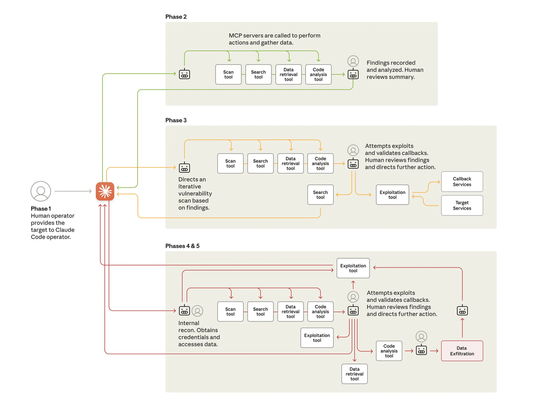2025-12-23 10:35:55
Samsung's Harman agrees to acquire ZF's radar and automotive computing driver-assistance business for €1.5B, as the European auto-supplier sector struggles (Bloomberg)
https://www.bloomberg.com/news/articles/2025-12-23…
2025-12-22 17:39:30
A Mega-Sena da virada fazendo muito pelo fim de preconceitos retrógrados: até os religiosos ultra-conservadores estão querendo ser bi agora rs.
2025-11-22 19:50:50
Wow. I've dealt with various toxic personalities in software development, but a good portion of the time those toxic personalities were at least extremely knowledgeable in their (often, very limited) domain.
AI, however, seems to be enabling toxic personalities *who are completely clueless*. Impressive!
https://github…
2025-11-14 14:02:08
Before you head out for the weekend, check out today's Metacurity for the most critical infosec developments you should know, including
--Chinese state hackers used Anthropic to automate cyber intrusions,
--UK MoD knew of Excel's security risks before Afghan data leak,
--NHS investigates Clop's attack claims,
--ASUS patches DSL router critical flaws,
--DoorDash reveals October security incident,
--US feds warn of Akira's expanded encryption …
2025-11-17 22:37:40
This is a good video about Masculinity. I generally agree with it. Galloway get a lot wrong on gender. Though I don't really think he is a grifter. I think he cares about the topic and wants a good out come not too far off what the person in this video wants.
As I think more about big tent politics I wonder if this video could do more calling in then calling out. There are real enemies out there and to me, at this time, Galloway is a mistaken ally rather then an enemy
2025-12-28 15:34:13
Heute nach Wochen mal wieder zu einer etwas längeren #Radtour #rausgeschafft: 25km bei um den Gefrierpunkt fürs #Frostpendeln-Konto, und 124hm fürs Ego, wenn auch die meiste Zeit mit dem elektrischen …
2025-12-22 11:50:19
Crosslisted article(s) found for cs.LG. https://arxiv.org/list/cs.LG/new
[1/3]:
- Optimizing Text Search: A Novel Pattern Matching Algorithm Based on Ukkonen's Approach
Xinyu Guan, Shaohua Zhang
https://arxiv.org/abs/2512.16927 https://mastoxiv.page/@arXiv_csDS_bot/115762062326187898
- SpIDER: Spatially Informed Dense Embedding Retrieval for Software Issue Localization
Shravan Chaudhari, Rahul Thomas Jacob, Mononito Goswami, Jiajun Cao, Shihab Rashid, Christian Bock
https://arxiv.org/abs/2512.16956 https://mastoxiv.page/@arXiv_csSE_bot/115762248476963893
- MemoryGraft: Persistent Compromise of LLM Agents via Poisoned Experience Retrieval
Saksham Sahai Srivastava, Haoyu He
https://arxiv.org/abs/2512.16962 https://mastoxiv.page/@arXiv_csCR_bot/115762140339109012
- Colormap-Enhanced Vision Transformers for MRI-Based Multiclass (4-Class) Alzheimer's Disease Clas...
Faisal Ahmed
https://arxiv.org/abs/2512.16964 https://mastoxiv.page/@arXiv_eessIV_bot/115762196702065869
- Probing Scientific General Intelligence of LLMs with Scientist-Aligned Workflows
Wanghan Xu, et al.
https://arxiv.org/abs/2512.16969 https://mastoxiv.page/@arXiv_csAI_bot/115762050529328276
- PAACE: A Plan-Aware Automated Agent Context Engineering Framework
Kamer Ali Yuksel
https://arxiv.org/abs/2512.16970 https://mastoxiv.page/@arXiv_csAI_bot/115762054461584205
- A Women's Health Benchmark for Large Language Models
Elisabeth Gruber, et al.
https://arxiv.org/abs/2512.17028 https://mastoxiv.page/@arXiv_csCL_bot/115762049873946945
- Perturb Your Data: Paraphrase-Guided Training Data Watermarking
Pranav Shetty, Mirazul Haque, Petr Babkin, Zhiqiang Ma, Xiaomo Liu, Manuela Veloso
https://arxiv.org/abs/2512.17075 https://mastoxiv.page/@arXiv_csCL_bot/115762077400293945
- Disentangled representations via score-based variational autoencoders
Benjamin S. H. Lyo, Eero P. Simoncelli, Cristina Savin
https://arxiv.org/abs/2512.17127 https://mastoxiv.page/@arXiv_statML_bot/115762251753966702
- Biosecurity-Aware AI: Agentic Risk Auditing of Soft Prompt Attacks on ESM-Based Variant Predictors
Huixin Zhan
https://arxiv.org/abs/2512.17146 https://mastoxiv.page/@arXiv_csCR_bot/115762318582013305
- Application of machine learning to predict food processing level using Open Food Facts
Arora, Chauhan, Rana, Aditya, Bhagat, Kumar, Kumar, Semar, Singh, Bagler
https://arxiv.org/abs/2512.17169 https://mastoxiv.page/@arXiv_qbioBM_bot/115762302873829397
- Systemic Risk Radar: A Multi-Layer Graph Framework for Early Market Crash Warning
Sandeep Neela
https://arxiv.org/abs/2512.17185 https://mastoxiv.page/@arXiv_qfinRM_bot/115762275982224870
- Do Foundational Audio Encoders Understand Music Structure?
Keisuke Toyama, Zhi Zhong, Akira Takahashi, Shusuke Takahashi, Yuki Mitsufuji
https://arxiv.org/abs/2512.17209 https://mastoxiv.page/@arXiv_csSD_bot/115762341541572505
- CheXPO-v2: Preference Optimization for Chest X-ray VLMs with Knowledge Graph Consistency
Xiao Liang, Yuxuan An, Di Wang, Jiawei Hu, Zhicheng Jiao, Bin Jing, Quan Wang
https://arxiv.org/abs/2512.17213 https://mastoxiv.page/@arXiv_csCV_bot/115762574180736975
- Machine Learning Assisted Parameter Tuning on Wavelet Transform Amorphous Radial Distribution Fun...
Deriyan Senjaya, Stephen Ekaputra Limantoro
https://arxiv.org/abs/2512.17245 https://mastoxiv.page/@arXiv_condmatmtrlsci_bot/115762447037143855
- AlignDP: Hybrid Differential Privacy with Rarity-Aware Protection for LLMs
Madhava Gaikwad
https://arxiv.org/abs/2512.17251 https://mastoxiv.page/@arXiv_csCR_bot/115762396593872943
- Practical Framework for Privacy-Preserving and Byzantine-robust Federated Learning
Baolei Zhang, Minghong Fang, Zhuqing Liu, Biao Yi, Peizhao Zhou, Yuan Wang, Tong Li, Zheli Liu
https://arxiv.org/abs/2512.17254 https://mastoxiv.page/@arXiv_csCR_bot/115762402470985707
- Verifiability-First Agents: Provable Observability and Lightweight Audit Agents for Controlling A...
Abhivansh Gupta
https://arxiv.org/abs/2512.17259 https://mastoxiv.page/@arXiv_csMA_bot/115762225538364939
- Warmer for Less: A Cost-Efficient Strategy for Cold-Start Recommendations at Pinterest
Saeed Ebrahimi, Weijie Jiang, Jaewon Yang, Olafur Gudmundsson, Yucheng Tu, Huizhong Duan
https://arxiv.org/abs/2512.17277 https://mastoxiv.page/@arXiv_csIR_bot/115762214396869930
- LibriVAD: A Scalable Open Dataset with Deep Learning Benchmarks for Voice Activity Detection
Ioannis Stylianou, Achintya kr. Sarkar, Nauman Dawalatabad, James Glass, Zheng-Hua Tan
https://arxiv.org/abs/2512.17281 https://mastoxiv.page/@arXiv_csSD_bot/115762361858560703
- Penalized Fair Regression for Multiple Groups in Chronic Kidney Disease
Carter H. Nakamoto, Lucia Lushi Chen, Agata Foryciarz, Sherri Rose
https://arxiv.org/abs/2512.17340 https://mastoxiv.page/@arXiv_statME_bot/115762446402738033
toXiv_bot_toot
2026-01-02 08:27:41
Schneetreiben, Frostgrenze. Erster Drehtag für #Speckschweiz Doku in BERLIN. Warum dort? Aufklärung später.
Gesamte Ausrüstung mit 3 Kameras und Stativen im Rucksack.
2025-12-02 18:05:43
The Pentagon denied the AP and others access to a few news briefings, claiming they're orientation events for the new press corps, which now includes Matt Gaetz (David Bauder/Associated Press)
https://apnews.com/article/pentagon-pre…
2026-01-04 21:36:13
Mandei um diff -r entre dois diretórios e ele estš hš mais de uma hora rodando. Agora que parei pra pensar que são diretórios grandes (87GB) e um deles é um diretório dentro do drive virtual do pcloud (ou seja, acho que funciona como um diretório remoto). Acho que mesmo se eu deixar este computador ligado durante toda a noite este comando não vai terminar de rodar. 😬







